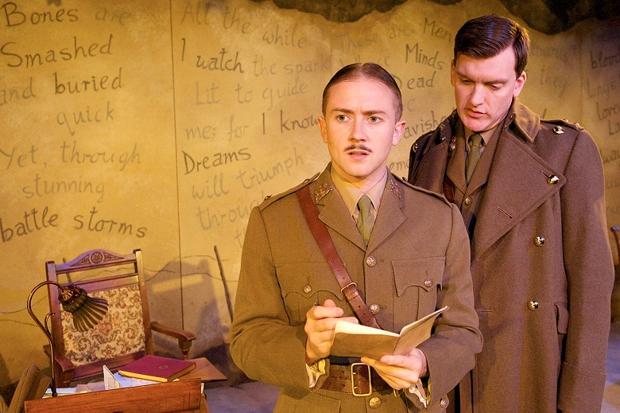Not About Heroes, Trafalgar Studios, SW1
reviewed for The Times, 13 November 2014

Simon Jenkins, left, as Owen, with Alasdair Craig as Sassoon (Photo credit: Elliott Franks)
Dead poets can get one down. Any play about the doomed Wilfred Owen, all too aware of the futility of a war in which he would die at 25, risks wallowing in the maudlin. However, the surprisingly compelling Not About Heroes, a gentle two-hander about the relationship between Owen and his mentor Siegfried Sassoon, should win round even the most cynical of hearts.
This isn’t a play about war, or even about death, so much as about friendship as it blurs into love. Constructed almost exclusively from the pair’s poems and from the playwright Stephen MacDonald’s painstaking research into their letters, this is a worthy act of remembrance — and one that deserves to be packed with school classes.
Caroline Clegg’s clean, crisp production is anchored by a performance of rare charisma from Alasdair Craig as the elder poet, Sassoon. A decorated war hero, Sassoon used his fame to denounce the war in 1917 and promptly found himself buried away in Craiglockhart Military Hospital near Edinburgh by an Army establishment happier to declare him mentally unwell than risk the publicity of a court martial.
So Craig’s Sassoon is bitter, frustrated and far too intelligent for his surroundings — until Simon Jenkins’ pallid, self-conscious Owen knocks on his door, asking for an autograph. In a play about fear and war, this is the greatest act of courage to which we can be privy: Owen’s hands tremble as much from fan-worship as from the shellshock that has seen him too temporarily put in hospital. And so begins a play about the audacity of speech: the tyranny of the blank page, the danger of dissent and the love that dare not speak its name.
Owen and Sassoon spend the play denying their heroism, but MacDonald gladly makes heroes of them. This becomes a problem as we move to the more indulgent second act, the play slipping from memorial to hagiography, the text from critique to cliché. As it drags it begins to feel more like a walk through history, paying lip service to every necessary paragraph of Owen’s Wikipedia entry. Although Jenkins aptly charts Owen’s growth in confidence — Clegg’s production lightly traces the pair’s class differences — he can’t match Craig’s textured, taut clarity, especially in delivering the poetry that powers the play. But it’s impossible to walk away unmoved. Impressive.






